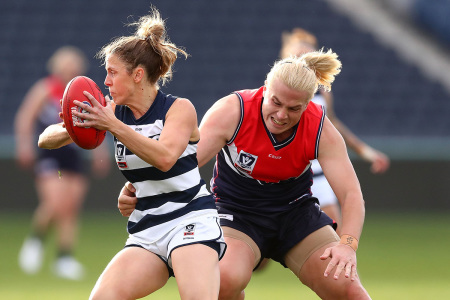Texas passes law banning boys from competing on girls' sports teams

Texas’ Republican Gov. Greg Abbott has signed a bill into law that requires students to participate on sports teams that correspond with their biological sex, as determined by the birth certificate issued at or near the time they were born.
Abbott signed House Bill 25 into law on Monday, which bans students from participating in sports leagues for the opposite sex. It will take effect in January 2022.
“… An interscholastic athletic team sponsored or authorized by a school district or open-enrollment charter school may not allow a student to compete in an interscholastic athletic competition sponsored or authorized by the district or school that is designated for the biological sex opposite to the student’s biological sex,” stated the legislation.
The new law stipulates that only birth certificates “entered at or near the time of the student’s birth” can be considered legitimate in determining a student’s eligibility to participate in a sports league. The current policy of the United Interscholastic League, which governs collegiate athletics in Texas, recognizes “changes to an [individual’s] birth certificate” to reflect their new gender identity if approved by a court.
HB 25 does include an exemption allowing a biological female to compete in men’s sports if “a corresponding interscholastic athletic competition designated for female students is not offered or available.”
Terry Schilling, president of the American Principles Project, was critical of the new legislation, saying in a statement that he felt the new law was only “a minimal step toward protecting female athletes” and “hardly sufficient in accomplishing that goal.”
“For example, this new law does not cover collegiate athletics, meaning women at that level are still at risk of losing titles and scholarships to biological males,” said Schilling. “The bill also does not give female athletes the right to take their cases to civil court, neglecting the most effective means of enforcement.”
Adri Pèrez, a Texas-based policy and advocacy strategist for the ACLU, told 19thnews that they were considering potential legal action against the new law.
“There has been debate since this bill was first filed about what the enforcement mechanism would be,” said Pèrez. “It would open it up so that anybody could bring a gender challenge against another student because of their athletic performance, and/or appearance.”
Supporters of legislation like HB 25 point to biology as the justification for their position. Last December, a study published by the British Journal of Sports Medicine revealed that men who identify as transgender maintain a competitive advantage over female athletes.
Fox News opinion host Laura Ingraham previously elaborated on the biological differences between men and women that give males an advantage in competitive sports, nothing that, “Male bones are bigger in both size and density. Females have shorter arms and legs relative to body size. Females are around 30% to 35% muscle by weight, while males are up to 40% to 50% muscle.”
“Females’ ligaments are thinner and softer than males. The internal organs of … men tend to be bigger, broader, more capable of taking in oxygen. … The structure of the anatomy is different. Period,” she added.
Texas is one of several states that have passed bills requiring athletes to play on sports teams that correspond with their biological sex. According to Women’s Liberation Front, an organization that supports such legislation, the others are Alabama, Arkansas, Florida, Idaho, Mississippi, Montana, Tennessee and West Virginia.
The enactment of bills requiring athletes to compete on sports teams that correspond to their biological sex comes as Democrats in Congress have pushed for the passage of the Equality Act, legislation that would require schools to allow trans-identified athletes to play on sports teams that correspond with their gender identity.
The bill passed the Democrat-controlled House of Representatives on a largely party-line vote earlier this year but has stalled in the evenly split Senate due to opposition from both Democrats and Republicans.





















